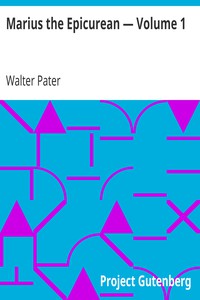Marius the Epicurean — Volume 2, Walter Pater [best romantic novels in english txt] 📗

- Author: Walter Pater
Book online «Marius the Epicurean — Volume 2, Walter Pater [best romantic novels in english txt] 📗». Author Walter Pater
“Why, when I went out to walk off my wayward fancies, did I confront the very sort of incident (my unfortunate genius had surely beckoned it from afar to vex me) likely to irritate them further? A party of men were coming down the street. They were leading a fine race-horse; a handsome beast, but badly hurt somewhere, in the circus, and useless. They were taking him to slaughter; and I think the animal knew it: he cast such looks, as if of mad appeal, to those who passed him, as he went among the strangers to whom his former owner had committed him, to die, in his beauty and pride, for just that one mischance or fault; although the morning air was still so animating, and pleasant to snuff. I could have fancied a human soul in the creature, swelling against its luck. And I had come across the incident just when it would figure to me as the very symbol of our poor humanity, in its capacities for pain, its wretched accidents, and those imperfect sympathies, which can never quite identify us with one another; the very power of utterance and appeal to others seeming to fail us, in proportion as our sorrows come home to ourselves, are really our own. We are constructed for suffering! What proofs of it does but one day afford, if we care to note them, as we go—a whole long chaplet of sorrowful mysteries! Sunt lacrimae rerum et mentem mortalia tangunt.+
“Men’s fortunes touch us! The little children of one of those institutions for the support of orphans, now become fashionable among us by way of memorial of eminent persons deceased, are going, in long file, along the street, on their way to a holiday in the country. They halt, and count themselves with an air of triumph, to show that they are all there. Their gay chatter has disturbed a little group of peasants; a young woman and her husband, who have brought the old mother, now past work and witless, to place her in a house provided for such afflicted people. They are fairly affectionate, but anxious how the thing they have to do may go—hope only she may permit them to leave her there behind quietly. And the poor old soul is excited by the noise made by the children, and partly aware of what is going to happen with her. She too begins to count—one, two, three, five—on her trembling fingers, misshapen by a life of toil.
‘Yes! yes! and twice five make ten’—they say, to pacify her. It is her last appeal to be taken home again; her proof that all is not yet up with her; that she is, at all events, still as capable as those joyous children.
“At the baths, a party of labourers are at work upon one of the great brick furnaces, in a cloud of black dust. A frail young child has brought food for one of them, and sits apart, waiting till his father comes—watching the labour, but with a sorrowful distaste for the din and dirt. He is regarding wistfully his own place in the world, there before him. His mind, as he watches, is grown up for a moment; and he foresees, as it were, in that moment, all the long tale of days, of early awakings, of his own coming life of drudgery at work like this.
“A man comes along carrying a boy whose rough work has already begun—the only child—whose presence beside him sweetened the father’s toil a little. The boy has been badly injured by a fall of brick-work, yet, with an effort, he rides boldly on his father’s shoulders. It will be the way of natural affection to keep him alive as long as possible, though with that miserably shattered body.—‘Ah! with us still, and feeling our care beside him!’—and yet surely not without a heartbreaking sigh of relief, alike from him and them, when the end comes.
“On the alert for incidents like these, yet of necessity passing them by on the other side, I find it hard to get rid of a sense that I, for one, have failed in love. I could yield to the humour till I seemed to have had my share in those great public cruelties, the shocking legal crimes which are on record, like that cold-blooded slaughter, according to law, of the four hundred slaves in the reign of Nero, because one of their number was thought to have murdered his master. The reproach of that, together with the kind of facile apologies those who had no share in the deed may have made for it, as they went about quietly on their own affairs that day, seems to come very close to me, as I think upon it. And to how many of those now actually around me, whose life is a sore one, must I be indifferent, if I ever become aware of their soreness at all? To some, perhaps, the necessary conditions of my own life may cause me to be opposed, in a kind of natural conflict, regarding those interests which actually determine the happiness of theirs. I would that a stronger love might arise in my heart!
“Yet there is plenty of charity in the world. My patron, the Stoic emperor, has made it even fashionable. To celebrate one of his brief returns to Rome lately from the war, over and above a largess of gold pieces to all who would, the public debts were forgiven. He made a nice show of it: for once, the Romans entertained themselves with a good-natured spectacle, and the whole town came to see the great bonfire in the Forum, into which all bonds and evidence of debt were thrown on delivery, by the emperor himself; many private creditors following his example. That was done well enough! But still the feeling returns to me, that no charity of ours can get at a certain natural unkindness which I find in things themselves.
“When I first came to Rome, eager to observe its religion, especially its antiquities of religious usage, I assisted at the most curious, perhaps, of them all, the most distinctly marked with that immobility which is a sort of ideal in the Roman religion. The ceremony took place at a singular spot some miles distant from the city, among the low hills on the bank of the Tiber, beyond the Aurelian Gate. There, in a little wood of venerable trees, piously allowed their own way, age after age—ilex and cypress remaining where they fell at last, one over the other, and all caught, in that early May-time, under a riotous tangle of wild clematis—was to be found a magnificent sanctuary, in which the members of the Arval College assembled themselves on certain days. The axe never touched those trees—Nay! it was forbidden to introduce any iron thing whatsoever within the precincts; not only because the deities of these quiet places hate to be disturbed by the harsh noise of metal, but also in memory of that better age—the lost Golden Age—the homely age of the potters, of which the central act of the festival was a commemoration.
“The preliminary ceremonies were long and complicated, but of a character familiar enough. Peculiar to the time and place was the solemn exposition, after lavation of hands, processions backwards and forwards, and certain changes of vestments, of the identical earthen vessels—veritable relics of the old religion of Numa!—the vessels from which the holy Numa himself had eaten and drunk, set forth above a kind of altar, amid a cloud of flowers and incense, and many lights, for the veneration of the credulous or the faithful.
“They were, in fact, cups or vases of burnt clay, rude in form: and the religious veneration thus offered to them expressed men’s desire to give honour to a simpler age, before iron had found place in human life: the persuasion that that age was worth remembering: a hope that it might come again.
“That a Numa, and his age of gold, would return, has been the hope or the dream of some, in every period. Yet if he did come back, or any equivalent of his presence, he could but weaken, and by no means smite through, that root of evil, certainly of sorrow, of outraged human sense, in things, which one must carefully distinguish from all preventible accidents. Death, and the little perpetual daily dyings, which have something of its sting, he must necessarily leave untouched. And, methinks, that were all the rest of man’s life framed entirely to his liking, he would straightway begin to sadden himself, over the fate—say, of the flowers! For there is, there has come to be since Numa lived perhaps, a capacity for sorrow in his heart, which grows with all the growth, alike of the individual and of the race, in intellectual delicacy and power, and which will find its aliment.
“Of that sort of golden age, indeed, one discerns even now a trace, here and there. Often have I maintained that, in this generous southern country at least, Epicureanism is the special philosophy of the poor. How little I myself really need, when people leave me alone, with the intellectual powers at work serenely. The drops of falling water, a few wild flowers with their priceless fragrance, a few tufts even of half-dead leaves, changing colour in the quiet of a room that has but light and shadow in it; these, for a susceptible mind, might well do duty for all the glory of Augustus. I notice sometimes what I conceive to be the precise character of the fondness of the roughest working-people for their young children, a fine appreciation, not only of their serviceable affection, but of their visible graces: and indeed, in this country, the children are almost always worth looking at. I see daily, in fine weather, a child like a delicate nosegay, running to meet the rudest of brick- makers as he comes from work. She is not at all afraid to hang upon his rough hand: and through her, he reaches out to, he makes his own, something from that strange region, so distant from him yet so real, of the world’s refinement. What is of finer soul, of finer stuff in things, and demands delicate touching—to him the delicacy of the little child represents that: it initiates him into that. There, surely, is a touch of the secular gold, of a perpetual age of gold. But then again, think for a moment, with what a hard humour at the nature of things, his struggle for bare life will go on, if the child should happen to die. I observed to-day, under one of the archways of the baths, two children at play, a little seriously—a fair girl and her crippled younger brother.





Comments (0)